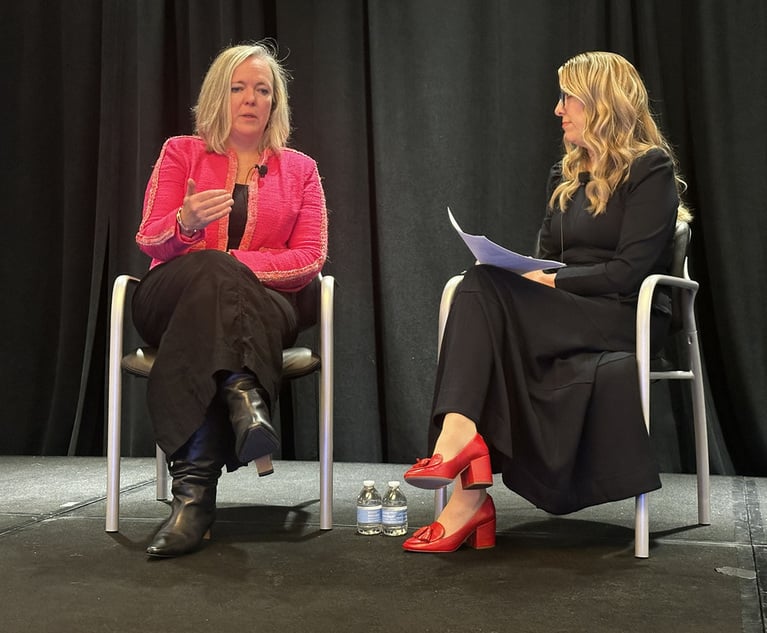 Dr. Silvia Hodges Silverstein, executive director of Buying Legal Council.
Dr. Silvia Hodges Silverstein, executive director of Buying Legal Council.Report: Procurement and Legal's Relationship Is Improving, but There's Room for Growth
A new report from Buying Legal Council found procurement professionals are increasingly involved in outside counsel and legal service hiring decisions, though more than half are still sometimes left out, especially on high-risk matters.
June 05, 2019 at 06:16 PM
4 minute read
Legal procurement professionals are increasingly engaged in outside counsel and service provider selections, a Wednesday-released report from Buying Legal Council found, but their relationship with in-house counsel isn't yet perfect.
More than half of 103 respondents to legal procurement organization Buying Legal Council's 2019 Market Intelligence Report said they had at least some influence over their companies' legal service selection. An additional 40% said they “influenced the purchases of all legal services,” up from less than 10% of respondents in Buying Legal Council's inaugural annual report, according to executive director Dr. Silvia Hodges Silverstein.
“You see some companies where procurement is now a clearly established partner with the legal department and legal ops,” Silverstein said in an interview.
Legal's perception of procurement success increased with professionals' tenure. Procurement professionals with more than a decade of experience were perceived as the most successful and the most likely to implement advanced strategies.
Respondents listed some of their top procurement goals as: better managing legal work, reducing legal spend, better analyzing legal data, and implementing formal strategies and processes. These goals require cooperation from legal ops and in-house lawyers.
The overwhelming majority of respondents described their relationship with legal ops as “partners” or “collegial,” 43% and 38% respectively, though 14% said legal ops is still “reluctant.” Respondents' companies had, on average, around three professionals in procurement versus seven in legal ops. Silverstein said around 10% of procurement professionals have a legal background, fewer than legal ops, but that in her experience a law degree doesn't impact buyers' performance.
According to the report, the strength of procurement's relationship with both legal operations and in-house counsel is positively correlated with procurement's success. One-third of respondents described in-house counsel as “partners,” with an additional 43% describing the relationship as “collegial,” an improvement from previous years.
But procurement's relationship with in-house counsel still often lacks trust and inclusion when it comes to legal service selection for high-risk matters. More than 85% of respondents reported influencing “routine” work and more than 70% influenced “complex” work, while only around 50% played a role in legal service selection for “high risk” or “bet the company” type of work.
“The issue is that when some in-house counsel face high-risk [matters] they waive the exception card as legal departments have done for a long time,” Silverstein said. She added in matters of all risk levels, procurement never has the final say in who is hired, they “facilitate the decision making” with data.
Buying Legal Council's report also outlined procurement strategies for reducing spend in the long and short term. Refining outside counsel guidelines and improving time and ratekeeper management and law firm selection and management are all strategies that could offer near immediate savings, according to the report.
Panel convergence strategy is listed as the most difficult strategy in terms of change management, and the one with the longest wait time to achieve savings. But Silverstein said convergence is a key procurement strategy because it allows legal departments to build stronger relationships with firms and negotiate better pricing.
Despite this, Buying Legal Council found that respondents' companies used an average of 199 traditional law firms over the past year, up from 149 in 2018, reversing the previous trend of legal team's converging their outside counsel or using panels.
“If you spread to too many firms, that is problematic,” Silverstein said.
Read More:
This content has been archived. It is available through our partners, LexisNexis® and Bloomberg Law.
To view this content, please continue to their sites.
Not a Lexis Subscriber?
Subscribe Now
Not a Bloomberg Law Subscriber?
Subscribe Now
NOT FOR REPRINT
© 2024 ALM Global, LLC, All Rights Reserved. Request academic re-use from www.copyright.com. All other uses, submit a request to [email protected]. For more information visit Asset & Logo Licensing.
You Might Like
View All
Health Care Giants Sue FTC, Allege Lina Khan Using Loaded Process to Vilify Pharmacy Benefit Managers
3 minute read
Porsche's Venture Capital Arm Adds General Counsel From Clifford Chance

How a 200,000-Worker Global Enterprise Took Down the Silos and Made ESG Its Mission
4 minute read
Corporate Counsel's 2024 Award Winners Performed Legal Wizardry, Gave a Hand Up to Others
Trending Stories
Who Got The Work
Michael G. Bongiorno, Andrew Scott Dulberg and Elizabeth E. Driscoll from Wilmer Cutler Pickering Hale and Dorr have stepped in to represent Symbotic Inc., an A.I.-enabled technology platform that focuses on increasing supply chain efficiency, and other defendants in a pending shareholder derivative lawsuit. The case, filed Oct. 2 in Massachusetts District Court by the Brown Law Firm on behalf of Stephen Austen, accuses certain officers and directors of misleading investors in regard to Symbotic's potential for margin growth by failing to disclose that the company was not equipped to timely deploy its systems or manage expenses through project delays. The case, assigned to U.S. District Judge Nathaniel M. Gorton, is 1:24-cv-12522, Austen v. Cohen et al.
Who Got The Work
Edmund Polubinski and Marie Killmond of Davis Polk & Wardwell have entered appearances for data platform software development company MongoDB and other defendants in a pending shareholder derivative lawsuit. The action, filed Oct. 7 in New York Southern District Court by the Brown Law Firm, accuses the company's directors and/or officers of falsely expressing confidence in the company’s restructuring of its sales incentive plan and downplaying the severity of decreases in its upfront commitments. The case is 1:24-cv-07594, Roy v. Ittycheria et al.
Who Got The Work
Amy O. Bruchs and Kurt F. Ellison of Michael Best & Friedrich have entered appearances for Epic Systems Corp. in a pending employment discrimination lawsuit. The suit was filed Sept. 7 in Wisconsin Western District Court by Levine Eisberner LLC and Siri & Glimstad on behalf of a project manager who claims that he was wrongfully terminated after applying for a religious exemption to the defendant's COVID-19 vaccine mandate. The case, assigned to U.S. Magistrate Judge Anita Marie Boor, is 3:24-cv-00630, Secker, Nathan v. Epic Systems Corporation.
Who Got The Work
David X. Sullivan, Thomas J. Finn and Gregory A. Hall from McCarter & English have entered appearances for Sunrun Installation Services in a pending civil rights lawsuit. The complaint was filed Sept. 4 in Connecticut District Court by attorney Robert M. Berke on behalf of former employee George Edward Steins, who was arrested and charged with employing an unregistered home improvement salesperson. The complaint alleges that had Sunrun informed the Connecticut Department of Consumer Protection that the plaintiff's employment had ended in 2017 and that he no longer held Sunrun's home improvement contractor license, he would not have been hit with charges, which were dismissed in May 2024. The case, assigned to U.S. District Judge Jeffrey A. Meyer, is 3:24-cv-01423, Steins v. Sunrun, Inc. et al.
Who Got The Work
Greenberg Traurig shareholder Joshua L. Raskin has entered an appearance for boohoo.com UK Ltd. in a pending patent infringement lawsuit. The suit, filed Sept. 3 in Texas Eastern District Court by Rozier Hardt McDonough on behalf of Alto Dynamics, asserts five patents related to an online shopping platform. The case, assigned to U.S. District Judge Rodney Gilstrap, is 2:24-cv-00719, Alto Dynamics, LLC v. boohoo.com UK Limited.
Featured Firms
Law Offices of Gary Martin Hays & Associates, P.C.
(470) 294-1674
Law Offices of Mark E. Salomone
(857) 444-6468
Smith & Hassler
(713) 739-1250






